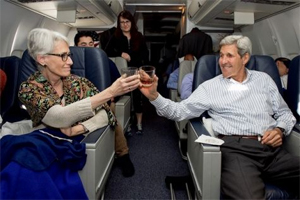|
Middlebury Institute of International Studies at Monterey
|
|
|
Iran Deal: Resources and Analysis
Amid the cacophony of opinions surrounding the historic July 14, 2015, agreement between the US, the EU, Germany, France, UK, Russia, China, and Iran, CNS has been
a reliable go-to source
for expert analysis, fact-based explanations, and useful visual resources.

In addition to the 3D video tours, maps, infographics, and high-resolution b-roll footage produced in partnership with the
Nuclear Threat Initiative
, CNS experts have been quoted extensively by the online, print, radio, and broadcast media, and have published their own articles in a variety of sources.
From Ferenc Dalnoki-Veress's
explanations of the science
behind the deal, Jeffrey Lewis's
big picture analysis,
Avner Cohen's analysis of the
effects on Israel
, Laura Rockwood's views as a former IAEA official, and many more, CNS continues to demonstrate that it is a leading forum for credible, nonpartisan, and expert information.
|
| North Korea's Bioweapon Program
North Korea's biological weapons program got a lot less secret on June 6, 2015. The same day that a defector reportedly fled the country carrying 15 GB of human testing data, North Korea's state media published photos of Kim Jong Un touring a facility ostensibly for the production of pesticides. However, analysis of the images reveals that the facility-the Pyongyang Bio-technical Institute-can produce regular, military-sized batches of biological weapons, specifically anthrax. Senior research associate Melissa Hanham's analysis revealed that North Korea is not only maintaining a biological weapon capability, but also has an active, large-scale sanctions-busting effort to illicitly procure the equipment for the Pyongyang Bio-technical Institute, which runs counter to international treaties, regimes, and national laws that aim to prevent the spread of biological weapons and related materials. Her revelatory article sparked a flurry of media reports, including major broadcasters in North and South Korea as well as VICE news. Read Melissa Hanham's article. |
| Reducing Radiological Threats
New CNS Occasional Paper
Replacing peaceful uses of radiological materials-- such as those used in medicine, drilling, food safety, and more-- is an important step in nuclear security and preventing a radiological disaster. But serious challenges remain.
As governments prepare for the 2016 Nuclear Security Summit, George M. Moore, CNS's scientist-in-residence, and Miles A. Pomper, senior research associate, offer a new CNS Occasional Paper that looks at the challenges to greater progress in this area, and offer ways to address them.
Read the report.
|
 |
 |
| High-Ranking Officials Praise MIIS/CNS Students
Consensus may be elusive on many arms control issues, but there is one subject on which many of the world's top nonproliferation and arms control experts agree: MIIS and CNS graduates are in hot demand in the field. And a new video on YouTube proves it.
At the Carnegie Endowment's annual conference on nonproliferation this year, in response to a question about where to find the next generation of specialists to work on nuclear weapons issues, Rose Gottemoeller, the U.S. undersecretary of state for arms control, and Lassina Zerbo, executive secretary of the Comprehensive Test-Ban Treaty Organization, both stated explicitly that they look to hire students educated by the MIIS, CNS, and CNS director Bill Potter. See what the world's top experts say about CNS grads. |
 |
Five Lessons Learned from Online CBRN Awareness Course
Chemical, biological, radiological, and nuclear (CBRN) incidents pose a rising threat to global safety and security. Many countries do not have the resources or information to adequately address this threat. Equally troubling is htat international training programs are also under budgetary pressure.
To address this conundrum, CNS-- in partnership with the EU CBRN Risk Mitigation Centres of Excellence-- created an online course to help better prepare the CBRN community to deal with this global threat.
Course leader Bryan L. Lee writes about the Five Lessons Learned from the beta version of this online course, which should help CBRN practitioners as much as fellow virtual educators on the subject.
Read more.
|
| Upcoming Events
- July 30-31, Monterey: Program On Strategic Stability Evaluation (POSSE) meeting.
-
September 10, 11, 15, 17, Washington:
"Issues in Chemical and Biological Weapons Proliferation," short course (closed).
-
|
|
|
|
|